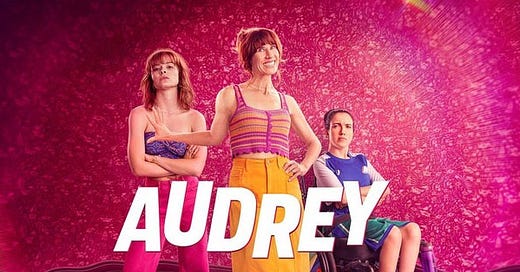Audrey
In this deeply twisted Aussie comedy, a mother finds her miserable life much improved when her brat drama daughter falls into a coma.
No foolin’ on this Fools Day — “Audrey” is a deeply twisted comedy from Down Under.
At first I thought the film, which hits VOD today on the usual online rental platforms, was a puckish uplifting romcom in the mold of “Muriel’s Wedding” or “Strictly Ballroom.” It’s about a has-been actress who finds her devotion to her family, especially the bratty daughter following in her footsteps, is colossally unappreciated, and decides to do something about it.
But no, it’s much bleaker and blacker.
Ronnie Willis (Jackie van Beek) is fortysomething and forgotten, a former Logie Award winner (equivalent to our Emmy) for a soap opera now long behind her. She runs a modest acting studio, is emotionally estranged from her husband, Cormack (Jeremy Lindsay Taylor) and barely seems to acknowledge her daughter Nora (Hannah Diviney), who has cerebral palsy and uses a wheelchair.
All of her energy flows to her oldest daughter, the titular Audrey, played by Josephine Blazier. A budding actress poised for great success, Audrey is also a miserable excuse of a young human. She’s not just indifferent to others’ feelings; she actively works to inflict cruelty upon them — chiefly Ronnie.
In some ways, Ronnie sees Audrey as her own reincarnation with another chance for success, and she’s not going to let it slide by — even if the kid is not worthy.
Directed by Natalie Bailey from a screenplay by Lou Sanz, “Audrey” has a really strange, zany tone. On the one hand it feels like nothing is really taken too seriously, particularly the way this dysfunctional family rags on each other mercilessly. And yet, it will find unexpected moments of vulnerability and even tenderness that surprise us.
During one of her frequent drama-queen acts, Audrey falls off the roof of the house and goes into a coma. At first Ronnie thinks this is just a hiccup in her career march — not even wanting to accept that doctor’s pronouncement the teen girl may never wake up.
Audrey had just gotten into a prestigious acting course taught by Lucinda (Gael Ballantyne), a once-famous actress, and Ronnie can’t stand the idea of her missing out on the exposure. So puts on her kid’s clothes, does what she can with hair and makeup, and enters the class herself as Audrey.
Now, van Beek is a lovely lady, but isn’t passing for 17 — and that’s the joke. Clearly Lucinda has her clocked already, but relishes the challenge of turning a washout actress into something.
Things start turning around for the rest for the family. Cormack, who’s been having erectile issues, stumbles into a side gig working in the Christian porn industry, where they turn stories from the Bible into blue movies. (You laugh, and I did, but I Googled it and it’s a real thing.) He also forms a filmmaking partnership with Burke (Aaron Fa'aoso), and it turns into something more.
This in turn relights his home fires, and he and Audrey start having some fairly eye-opening sex scenes — complete with, ah, his-and-her accoutrements.
Probably the biggest change comes with Nora. Used to being constantly ignored as the disabled kid sister of the popular girl, even subsisting on sardonic humor about her lack of any kind of presence, she starts to get invited to parties and appreciated. Audrey’s sorta-boyfriend Max (Fraser Anderson), who’s possibly an even more worthless person than her, even takes an interest. Without having to spend all the family’s spare cash on Audrey’s acting, Nora even gets to take up her desired hobby of fencing.
None of them want to admit it out loud, but the obvious truth is they’re all much happier with Audrey out of the picture. So what do they do if that… changes?
I have to say, Diviney steals absolutely every single scene she’s in. She lets us see Nora thinking, like the way she screws up her face into an expression of peevishness or disdain when she’s on the receiving end of the latest round of apathy or abuse. She’s basically a good-hearted person, but can’t help reveling at how much better everything is for her when Audrey’s not around.
Probably the biggest laugh I enjoyed during the movie was Nora’s reaction to a quip about Ronnie killing Audrey and then taking her own life. “Why couldn't mum murder-suicide me, too? What am I, f****** invisible?!?”
The movie loses energy during the third act, when the situation inevitably changes and the family members see all their newfound joy jump right out the window. The final set-up, with Ronnie starring in a stage production of “Medea” with a surprise guest intruding, has a very television sitcom feel to it.
(Unsurprising, as both writer and director have their roots there.)
Since Audrey goes away from the picture so long, the movie doesn’t get much of a chance to explore the theme of Ronnie working out her own failed dreams through her. Blazier even plays Ronnie in the flashback scenes to her youth. The tagline for the movie — “Live Your Best Life. Again.” — even positions this flick adjacent to those body-switcheroo comedies, especially “Freaky Friday.”
van Beek makes for an oddly sympathetic heroine who we want to cheer for, despite cringe-level behavior and bad decisions. She’s a selfish person who’s been trying to play-act as a giving one, and sooner or later Ronnie is going to have to realize that she can feed the beast of her own ego, or perish.
“Audrey” is a twisted, often funny movie about people we shouldn’t care about, but do.





